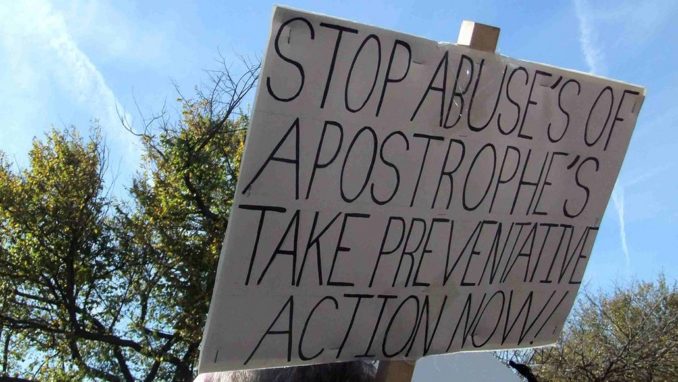
“Grammar Nazi”: the words spit out at me from the screen. Because the paucity of the allusion profoundly depresses me, I have decided to spare the complainants personal embarrassment by no longer highlighting their individual errors.
However, since nothing will stop me from aiming for perfection in the language I love, I set out below the most prevalent errors I see and hear on a daily basis, which you can choose to benefit from or ignore.
What makes you cringe? Is it someone calling the “lavatory” a “toilet”? Or someone with a regional accent? Or a typo? Or an abbreviation?
I can cope with all of these without experiencing a stomach-churning response. Use of “U” and “non-U” words is a question of choice and style, (more probably expressed by “loo” these days, in any case): regional accents are the rich relics of the Old English dialects of the pre-Conquest kingdoms: typos are not irritating, as long as it’s obvious what the intended word is, although their presence does indicate a certain lackadaisical attitude, and abbreviations, although over-used, especially in emails and blogs, are just about tolerable, but frustrating when you don’t know what they are supposed to represent.
No, what makes me cringe is the bare-faced abuse of the language I love. Yes, I admit it: I am a Language Lover, and an unrepentant one at that! Every one of us is privileged to speak and write the most modern language the world has ever seen, and, in my view, it behoves us to treat our great language with the respect it deserves.
I know English graduates, erstwhile teachers or librarians will agree with me, as well as those of us of a certain age, who benefited from a “traditional” education, and (hopefully) prospective employers. But, “Who cares?”, I can already hear the language vandals cry. Well, you all should, not to preserve our language in aspic, but to assist it in performing its essential function – communication.
Just imagine if you had been born a German, and had not only lost two world wars, but had to worry about choosing between three genders when you used a noun, not to mention tagging seemingly endless extra bits on to the end of verbs, and speaking as though you had a permanent bout of phlegm.
(Here, I must apologise to any fluent German speakers for my distinct lack of familiarity with the German language. I only learnt it for a year, and, even then, the motivation was purely that the lessons were held at the Boys’ School, that forbidden place where young ladies normally feared to tread, but sought any excuse to do so!)
I am much more comfortable comparing the French language and its illogical gender assignment: a female table with male bread, butter and cheese on its female tablecloth! And, by the way, get this wrong and you will also get wrong any adjective or pronoun which relates to the original noun.
Scope
This short essay does not pretend to be a comprehensive grammar treatise: rather, it is a reflection of the most common grammar and pronunciation errors which I see and hear every day which make me cringe.
I refer throughout to English English, not American English, which not only has many different words, spellings and meanings of words we have in common, but also allows some punctuations which most of us would never use.
The Apostrophe Catastrophe
One of the most recent and abused punctuations in the English language is the apostrophe (first used in the 16th Century). Consider this simple phrase:-
“Puffins blog”
This phrase can have three different meanings depending on the (correct) use and position of the apostrophe. Without an apostrophe, it states that Puffins carry out the action of blogging: Puffins’ blog indicates that Going Postal is the blog belonging to those who post on it, and Puffin’s blog indicates the blog of a single Puffin.
Kingsley Amis used the example of, “Those things are my husbands” as compared with, “Those things are my husband’s”.
Already we can see that meaning is blurred if we don’t take the time to punctuate correctly.
For those who have forgotten their school days, the correct use of the apostrophe is confined to:-
Expressing that something belongs to someone (also known as the genitive case)
Showing that a letter (or letters) is/are missing from a word.
Apostrophes are never, ever used to indicate a plural.
So, what can go wrong?
Why grocers, in particular, should be so inordinately fond of using apostrophes to indicate plurals remains a mystery, but I am sure that I am not the only one who cringes every time I pass such signs as “Fresh Cabbage’s”, “Fencing Post’s”.
Another common misuse of the apostrophe that I frequently see is its use to indicate the plural of abbreviations, such as MPs (not MP’s) or CDs (not CD’s). MP’s and CD’s can only be used when referring to something that belongs to a single MP or CD.
Another common problem is the word “its”. This word has two distinct meanings – “belonging to it” and “it is”. Only where “it is” is the sense is the apostrophe used when it is abbreviated to “it’s”, as in “it’s Freedom Day tomorrow”. This may appear contradictory as its other meaning indicates belonging to it, but, without getting technical, it is because it is a pronoun (i.e. a word which represents a noun) and pronouns do not take the apostrophe (as also “her”, “his”, “their”, “whose”).
Giles Brandreth’s favourite example of the importance of using the apostrophe when a letter is missing is to avoid the acute embarrassment of writing “Feeling your nuts”, instead of, “Feeling you’re nuts”
Another problem that arises is where to put the apostrophe when a word which is always plural is used. Based on the general “rules”, it might be thought that the apostrophe would come after the “s”, but, in these cases, it does, in fact come before the “s” (men’s as opposed to mens’, oxen’s as opposed to oxens’). Grumpy found an interesting BBC example of this recently: in a total fit of ineptitude, our national broadcaster managed to produce “mens’s”.
Finally, on the subject of apostrophes, is the decision about where to put the apostrophe when the word ends in “s”, for example the Jones’ house, rather than the Jones’s house. To a degree this is a stylistic choice, but a good rule of thumb is to write it as you would say it.
Less for Fewer
I hear this stomach-churning error every day – it seems like every minute of every day: “There were less Remainers on QT last night”, (if only). Remainers are (believe it or not) people, i.e. a plural noun, and, if there aren’t as many of them, there are “fewer” of them, never ever “less”. Less should only be used where the noun is singular, or where the “less” describes a verb or an adjective, e.g., “HMG wants us to use less sugar as well as less salt”, and “I think Sir Nigel is less involved than he was”,“ Matt Hancock is less cocky than he was”.
There, Their et al
English is a wonderful language, mainly due to its relative simplicity, but it does have one problem, especially for non-native speakers, pronunciation, especially where words with different meanings and different spellings are pronounced exactly the same. This can lead to incorrectly spelled written words. The most common of these is “there” instead of “their”. An easy way to avoid this error is to think that “there” is like “where”: it relates to a place, whereas “their” indicates that it belongs to people or things. Note: spelling of “their”, an exception to the rule, “I before e, except after c”.
And, speaking of “where”, this is too often incorrectly spelled as “were”. Again, the rule is easy: “were” is the past tense of “are”, as in, “The Puffins were on the Freedom March”, whereas “where” indicates place, as in, “This is where Matt Hancock canoodled with his paramour”.
Similarly, “stationery” and “stationary” are often confused. “Stationary” is an adjective describing a noun which has stopped, e.g. “The march was stationary”, whereas “stationery” is a noun which describes the things you buy to write on and the items you purchase to write on them, as in, “Sam Cam is a director of Smythson, which sells up-market stationery”.
Finally, in this section, we have “bare” and “bear”. Most people know that the former is an adjective which describes the state of nudity common on the pages of GP, and the latter is a noun describing a large hairy animal which frequents the woods (also frequently seen on GP). The problem comes when the word is used as a verb, as in, “I couldn’t bear to see another lockdown”: too often the incorrect “bare” is used in this context.
The Subjunctive
Those of you who laboured long and hard at school to identify where the subjunctive should be used in foreign languages may have thought that you had left those travails behind. Not so fast. English also uses the subjunctive, albeit that it is frequently not used where it should be. Consider, “I wish I was on the March”. I hope most of you spotted that the past tense “was” was incorrectly used, and the correct usage would have been, “I wish I were there”. The reason is that if you wish something, it cannot be a fact, and, if it is not a fact, it has to take the subjunctive. In a similar way, “Were I PM, I would implement Brexit in full” has to take the subjunctive because I am manifestly not PM.
If it’s any consolation to those of you who didn’t immediately spot this, the spellchecker also failed to pick up the error. What hope is there?
I Hate Haitch
I don’t often cringe at pronunciation, because, as I noted above, I think accents are part of the rich pattern of English. In fact, I even chose to learn Yorkshire dialect as a teenager for the sheer hell of it. However, there are a few common mispronunciations which do make me cringe.
First among these is the ubiquitous “haitch”. I banked with HSBC for 50 years, and, when I left them, they didn’t even pay me the courtesy of thanking me for my business. But, that’s another story. What I could never understand was how they could possibly have a recorded message on the telephone which mispronounced their own name. Perhaps they were too concerned with not being an island to worry about their British customers!
In English, the letter “h” is always pronounced “aitch”, but “h” at the beginning of a word can be silent or pronounced, and it is more frequently pronounced. The only “rule” I know is that most words with a silent “h” are of French derivation, e.g. honour. Not much help I know, but it really is worth learning them, because nothing sounds more uneducated than a misplaced “haitch”.
Another favourite mispronunciation is “mispronOunciation”. Or even “pronOunciation”. I have no idea why, but it seems to be gaining ground these days.
Possibly today’s favourite mispronunciation is harassment, pronounced as harASSment, whereas the correct emphasis should be on the first and the third syllables, “HArassMent”.
Misused Metaphors
George Orwell considered that all metaphors and similes, and especially over used ones, debased (or politicised) the English language. I disagree, and would counter that there would be no poetry without them. How would you rewrite, “My Love is like a red, red rose” without the simile? “My Love is red”?
However, in order to fulfil their function, they do have to be used correctly. I have two pet metaphor hates at the moment, which are invariably used incorrectly. What is “cut his cloth” supposed to mean (unless he is a tailor)? A meaningless metaphor is certainly worse than no metaphor at all since it confuses the issue rather than illuminating it. The correct metaphor is “to cut his coat according to his cloth” – a tailoring metaphor which makes complete sense, as in, “We poor OAPs must cut our coat according to our cloth”.
The other favourite misused metaphor is “off his own back”. Again, what is this supposed to mean? Consider, “He decided to go to SB’s bash off his own back”. It is sheer garbage! The correct usage is “off his own bat” – a comprehensible cricketing allusion, e.g. “AWS decided to comment on GB News rather than stop for the summer off his own bat”. (Well, that’s what I assume!)
So, take it or leave it. I don’t have the choice: I cannot unhear or unsee the gross disabuse of my beloved language.
© Chrissie 2021
The Goodnight Vienna Audio file



